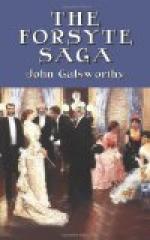Opposite the National Gallery June exclaimed:
“Of all undignified beasts and horrible laws!”
But Jolyon did not respond. He had something of his father’s balance, and could see things impartially even when his emotions were roused. Irene was right; Soames’ position was as bad or worse than her own. As for the law—it catered for a human nature of which it took a naturally low view. And, feeling that if he stayed in his daughter’s company he would in one way or another commit an indiscretion, he told her he must catch his train back to Oxford; and hailing a cab, left her to Turner’s water-colours, with the promise that he would think over that Gallery.
But he thought over Irene instead. Pity, they said, was akin to love! If so he was certainly in danger of loving her, for he pitied her profoundly. To think of her drifting about Europe so handicapped and lonely! ‘I hope to goodness she’ll keep her head!’ he thought; ’she might easily grow desperate.’ In fact, now that she had cut loose from her poor threads of occupation, he couldn’t imagine how she would go on—so beautiful a creature, hopeless, and fair game for anyone! In his exasperation was more than a little fear and jealousy. Women did strange things when they were driven into corners. ’I wonder what Soames will do now!’ he thought. ’A rotten, idiotic state of things! And I suppose they would say it was her own fault.’ Very preoccupied and sore at heart, he got into his train, mislaid his ticket, and on the platform at Oxford took his hat off to a lady whose face he seemed to remember without being able to put a name to her, not even when he saw her having tea at the Rainbow.
CHAPTER IV
WHERE FORSYTES FEAR TO TREAD
Quivering from the defeat of his hopes, with the green morocco case still flat against his heart, Soames revolved thoughts bitter as death. A spider’s web! Walking fast, and noting nothing in the moonlight, he brooded over the scene he had been through, over the memory of her figure rigid in his grasp. And the more he brooded, the more certain he became that she had a lover—her words, ‘I would sooner die!’ were ridiculous if she had not. Even if she had never loved him, she had made no fuss until Bosinney came on the scene. No; she was in love again, or she would not have made that melodramatic answer to his proposal, which in all the circumstances was reasonable! Very well! That simplified matters.
‘I’ll take steps to know where I am,’ he thought; ’I’ll go to Polteed’s the first thing tomorrow morning.’
But even in forming that resolution he knew he would have trouble with himself. He had employed Polteed’s agency several times in the routine of his profession, even quite lately over Dartie’s case, but he had never thought it possible to employ them to watch his own wife.
It was too insulting to himself!




